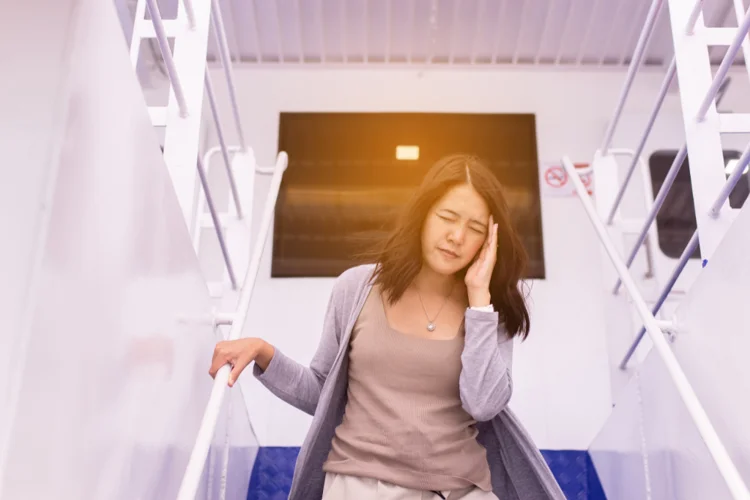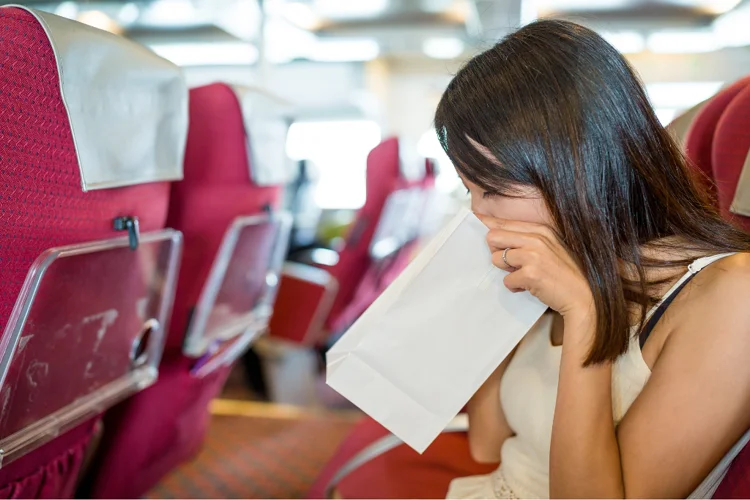Motion Sickness Pill Singapore
Last updated: Feb 20, 2026
What Is Motion Sickness?
Motion sickness is a common condition that can affect individuals during travel or
activities involving movement, causing symptoms such as nausea, vomiting, dizziness,
and cold sweats. Without proper management, it can turn an enjoyable experience
into a stressful and uncomfortable one.
Motion sickness medications can help prevent symptoms from developing and provide
relief if they do occur. Taking medication before travel is often the most
effective approach for those prone to motion sickness.

What Causes Motion Sickness?
Motion sickness occurs when the brain
receives conflicting signals from the visual, vestibular (inner ear), and proprioceptive
(body position) systems about motion. For instance, during travel, the inner ear senses movement,
but if the eyes remain focused on a stationary object, the brain interprets the conflicting
information as abnormal, leading to symptoms. Motion sickness commonly occurs during travel in cars,
buses, planes, or boats, on amusement rides such as roller coasters and simulators, or with
prolonged use of virtual reality headsets.
Factors that increase the likelihood of experiencing motion sickness include:
- Genetic Predisposition: A family history of motion sickness or sensitivity to sensory conflicts can increase susceptibility.
- Hormonal Influences: Fluctuations in hormones like estrogen and progesterone during pregnancy or menstruation can alter vestibular function and autonomic responses, increasing sensitivity to motion.
- Migraine Disorder: Individuals with migraines often have heightened vestibular sensitivity, increasing their risk.
Motion Sickness Symptoms

Symptoms of motion sickness can vary from slight discomfort to intense distress. Typical symptoms include:
- Nausea and vomiting
- Dizziness or lightheadedness
- Sweating and clamminess
- Fatigue or general unease
- Difficulty maintaining balance
How to Stop Motion Sickness?
If you begin to experience motion sickness, distraction techniques such as listening to soothing music, focusing on the horizon, or chewing gum can help shift your attention away from the discomfort. Natural remedies like ginger and chamomile are commonly used for their anti-nausea properties and may help reduce symptoms. Staying hydrated is also important, as dehydration can worsen fatigue and dizziness. For quick relief of nausea and vomiting, anti-nausea medication may help, whereas motion sickness medication is most effective when taken in advance to prevent symptoms from developing.
How Do Motion Sickness Pills Work?
Motion sickness medication works by targeting the root cause of the condition, which is the sensory conflict that disrupts normal brain function. They work through various mechanisms to prevent or alleviate symptoms:
- Blocking Nerve Signals: Antihistamines block histamine receptors in the brain, reducing overstimulation that would otherwise lead to nausea and dizziness, especially when taken before travel.
- Reducing Inner Ear Sensitivity: Certain medications suppress the vestibular system in the inner ear, minimising conflicting motion signals that could trigger symptoms.
- Calming the Brain's Vomiting Centre: Scopolamine, often delivered via a patch, reduces activity in the brain's vomiting centre, preventing nausea before it starts.
- Sedative Effect: Many motion sickness pills have sedative properties, which relax the nervous system and alleviate the physical discomfort associated with motion sickness.

Always follow dosage instructions on the medication and consult a doctor for personalised advice.
Price of Motion Sickness Medication
At ATA Medical, we provide motion sickness medication depending on your condition and individual needs, as determined by our doctors’ assessment. Prices are as follows:
| Medication | Price* |
|---|---|
| Consultation | From $49.05 |
| Motion Sickness Medications | From $0.27 |
| Injection for Motion Sickness (for severe cases) | $16.35 per dose |
^Prices last updated on Jan 28, 2026. While every effort is made to keep pricing information up to date, please contact our team to confirm the latest rates.
How to Avoid Motion Sickness?
Preventing motion sickness is often easier than treating it. Here are some tips that can help:
- Choose Optimal Seating: Sit in the front seat of a car, near the wings of an aeroplane, or at the centre of a boat, facing forward.
- Eat Light: Avoid heavy meals before travelling to reduce the likelihood of nausea.
- Take Medication Early: Consume motion sickness pills before travelling, following dosage instructions provided on the packaging or by your doctor.
- Focus on a Fixed Point: Align your visual and balance cues by looking at a fixed point outside.
- Avoid Triggers: Refrain from reading, using devices, or engaging in close-up tasks while in motion.
Different strategies work for different people, so it’s important to find what suits you best.
Where to Get Motion Sickness Pills in Singapore?
ATA Medical @ Tanjong Pagar
Nearest MRT: Tanjong Pagar Station (EW15)
Contact Number: 6223 0682
Email: hi@atamed.sg
Opening Hours:
Mon - Fri: 8:30 AM to 12:30 PM, 1:30 PM to 5:30 PM
Sat: 8:30 AM to 12:30 PM
Sun & PH: Closed
ATA Medical @ Orchard
Nearest MRT: Orchard Boulevard Station (TE13)
Contact Number: 6223 0682
Email: camden@atamed.sg
Opening Hours:
Mon - Fri: 8:30 AM to 12:30 PM, 1:30 PM to 5:30 PM
Sat: 8:30 AM to 12:30 PM
Sun & PH: Closed
ATA Medical @ Jurong
Nearest MRT: Jurong East MRT Station (NS1/EW24)
Contact Number: 6348 6292
Email: jurong@atamed.sg
Opening Hours:
Mon - Fri: 8:30 AM to 12:30 PM, 1:30 PM to 5:30 PM
Sat: 8:30 AM to 12:30 PM
Sun & PH: Closed


